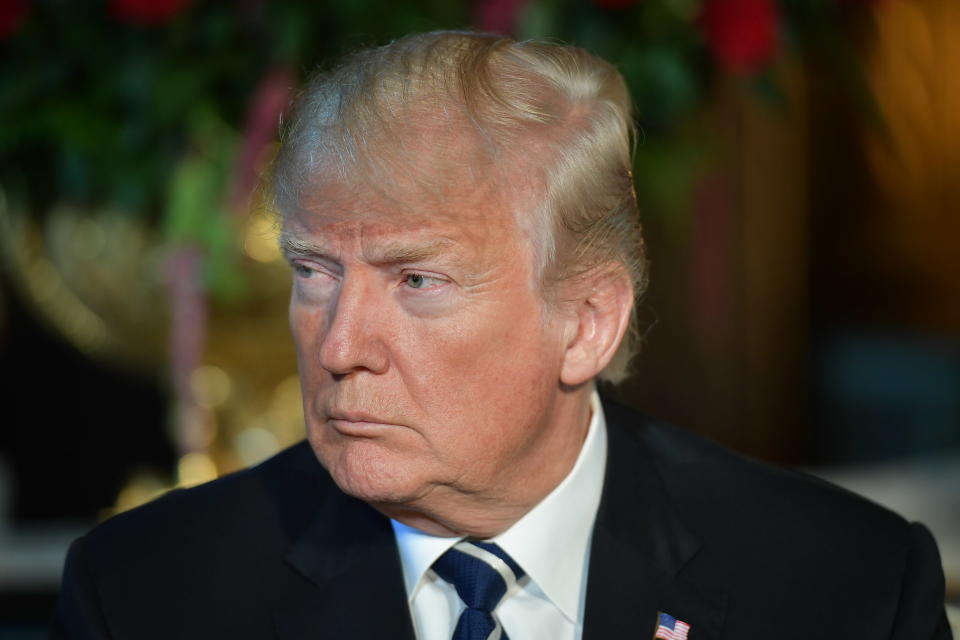Trump administration assures FIFA that policies wouldn't affect 2026 World Cup travel

The Donald Trump-led United States government has assured FIFA that its attempts to implement a ban on incoming travel from several predominantly Muslim countries would not affect a potential 2026 World Cup in North America.
In a letter sent to global soccer’s governing body last week, the Trump administration wrote that, if the U.S., Mexico and Canada were to win a June 13 vote for 2026 hosting rights, “all eligible athletes, officials and fans from all countries around the world would be able to enter the United States without discrimination.”
The letter was not public, but Decio de Maria, the president of Mexico’s soccer federation, revealed portions of it during a speech in Brussels on Tuesday in an apparent attempt to assuage concern that U.S. immigration policy could be problematic.
“Our three governments have provided the strong guarantees we need, including so that entry will be safe, reliable and convenient for every player and every fan,” De Maria, one of three United Bid committee co-chairs, said.
“Just as it did for the 2028 Olympic Games in Los Angeles, the United States government has stated that it intends to issue visas, subject to U.S. law ‘without regard to race, skin color, ethnic, national or social origin, gender, language, religion or sexual orientation.’”
Where does the 2026 World Cup bid stand?
The three North American nations have just one competitor for the 2026 World Cup, Morocco. And, as they have trumpeted, they are far better positioned economically to host it. With infrastructure already in place across the continent, the bid projects a profit of $11 billion for FIFA on $14 billion in revenue – more than double the entire 2014 World Cup cycle.
Morocco, on the other hand, would have to spend $15.8 billion on construction. Its initial proposals had deficiencies. And it, too, has a more serious human rights issue: Homosexuality is a crime in Morocco. The law that criminalizes it would seem to put the bid in violation of FIFA’s edict that tournaments must be held in nations free of “discrimination based on sexual orientation.”
Given all that, the North American bid would appear to be a runaway favorite. But the vote is in the hands of FIFA’s member associations – 207 national soccer federations, each with equal influence. Many of them prefer Morocco’s bid for reasons other than the quality of it.
Donald Trump’s impact on the 2026 World Cup bid
One of those reasons is, quite simply, that Morocco isn’t America. And while there are several prongs to anti-American sentiment, especially in global soccer – the U.S. Department of Justice investigation that has exposed corruption throughout the sport is apparently one – one is Trump. Approval ratings of American leadership worldwide have plummeted since Trump took office.
Trump, of course, will not still be in office in 2026. The government’s assurance that travel issues would be non-existent is very believable. But the current president’s policies and actions – and resultant anti-American sentiment globally – have, according to most reports, hindered a bid that Trump himself called a “U.S. bid.”
Bid officials from the three North American countries have been traveling across Europe and Asia this month, flying from Indonesia to Denmark to Dubai, campaigning for support. And as they have been, they have tried to spin Trump’s recent public support and threats as positives.
“I don’t see it as threatening,” U.S. Soccer president Carlos Cordeiro told Reuters of Trump’s comments. “I think you have got to appreciate how he says things. I think what was implicit in what he said was that he would like to see people support our bid and that is what I like my head of state to say.”
Bid officials have met regularly with members of the Trump administration, including the president’s son-in-law, Jared Kushner. As Cordeiro said, those meetings are “part and parcel” of the bidding process. A bid of this magnitude must be backed by national governments. The positive spin is that Trump’s tweet, and subsequent comments at a news conference, show voters around the world that the U.S. government is invested.
The negative spin is that his mere association with the bid will dog it. It has tried to rid itself of the conception that it is a “U.S. bid,” despite the plan to host 60 of 80 games stateside. Trump, in that regard, isn’t helping.
So while immigration policy might not be a direct hinderance, and while Trump’s tweet almost certainly doesn’t violate FIFA rules on political interference, the mere fact that de Maria felt the need to cite the U.S. government’s reassuring letter to FIFA is representative of why the United Bid has a real fight on its hands.
– – – – – – –
Henry Bushnell covers global soccer for Yahoo Sports. Have a tip? Question? Comment? Email him at henrydbushnell@gmail.com, or follow him on Twitter @HenryBushnell, and on Facebook.
More soccer from Yahoo Sports:
• McIntyre: How Mohamed Salah rose to superstardom
• Premier League DARTS: Picks for end-of-season, other superlatives
• Barcelona rides luck to fiery, controversial Clasico draw
• An emotional Arsenal sendoff for Arsene Wenger at Emirates
• No USMNT, Mexico at 2019 Copa America; Qatar instead


